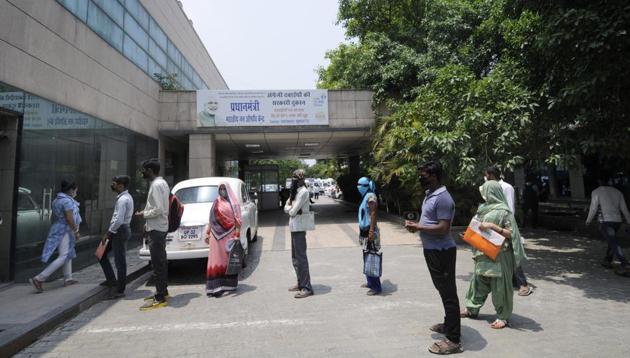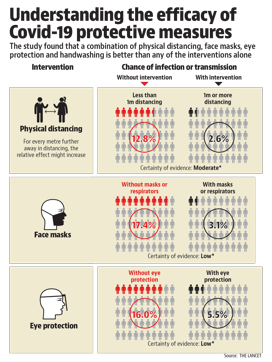2m distancing, masks key to stopping Covid-19 spread: Study
The study found that the risk of infection was 2.6% when people stand more than a metre away from the infected people, against 12.8% risk if they were within a metre, with modelling suggesting that the risk halved for every extra metre, up to three metres.
Keeping two metres away from others, and wearing face masks and eye protection, both in and outside hospitals, are the most effective ways of stopping the spread of Covid-19, according to the most comprehensive study to date on the transmission of the contagious pathogen.

But none of these interventions, even when properly used and combined, offer complete protection from infection, and other protective measures such as hand hygiene are needed to reduce the spread of the disease, according to a review of 172 studies from 16 countries published in the highly cited journal, The Lancet, on June 2.

“Based on the available evidence on physical distancing, face masks, eye protection and hand-washing, we cannot say which one is best at this point. They are all effective, but the combination of those interventions it likely better than any of the interventions alone,” said study co-lead Professor Holger Schünemann, department of Health Research Methods, Evidence and Impact at McMaster University in Canada, on email.
Coronavirus outbreak: Full coverage
The study found that the risk of infection was 2.6% when people stand more than a metre away from the infected people, against 12.8% risk if they were within a metre, with modelling suggesting that the risk halved for every extra metre, up to three metres.
Masks and protective eye coverings also added protective benefits, though the evidence for that was less clear cut, said the analysis, which was part-funded by the World Health Organization (WHO). The chance of infection was 3.1% for those wearing a face mask, and 17.4% for those without, while using face shields and glasses reduced the risk of transmission to 5.5%, down from 16% without use.
“There is not a real difference between a cloth mask and a face covering like a bandana. We did not specifically look at these masks but they may protect spreading Covid-19 from the person wearing it. N-95, medical or surgical masks, and 12-16 layer cotton masks provide protection, based on the data we found,” said Professor Schünemann, who co-authored the review of studies on how physical distancing, face masks, and eye protection affect the spread of three diseases caused by coronaviruses -- Covid-19, severe acute respiratory syndrome (Sars), and Middle-East respiratory syndrome (Mers).
“[The study authors] also report that respirators and multilayer masks are more protective than are single layer masks. This finding is vital to inform the proliferation of home-made cloth mask designs, many of which are single-layered. A well designed cloth mask should have water-resistant fabric, multiple layers, and good facial fit… Universal face mask use might enable safe lifting of restrictions in communities seeking to resume normal activities and could protect people in crowded public settings and within households,” said Professor Raina MacIntyre from the Kirby Institute, University of New South Wales in Australia, in an accompanying comment. She was not involved in the study.
With the pandemic yet to peak in India according to several experts, clinicians say protective behaviours are critical to stop the spread. “The only way we can decrease the number of cases from spiking is by aggressive isolation, a lot of community participation in terms of very strict wearing of masks, social distancing and frequent hand-washing. I would say, we literally need policing of masks and other social distancing behaviours to enforce compliance, whether you are in office, whether you are travelling, whether you are out, to prevent a spike in numbers,” said Dr Randeep Guleria, director, All India Institute of Medical Sciences (AIIMS).
The current evidence suggests that Covid-19 is most commonly spread by respiratory droplets, especially when people cough and sneeze, entering through the eyes, nose, and mouth, either directly or by touching a contaminated surface, but there is increasing concern about the extent of transmission through aerosols, which are tiny saliva and vapour droplets suspended in air in some settings.
“The current evidence on aerosol spread of Covid-19 is not conclusive – there are studies supporting easier aerosolisation and those that suggest it is aerosolised only in the context of procedures in the hospital,” said Professor Schünemann, referring to his study on the risk of Covid-19 transmission to health workers in ICUs through aerosol-generating procedures such as non-invasive ventilation and invasive mechanical ventilation. The study was published in the Annals of Internal Medicine on May 22.
The new study, which was conducted to inform WHO guidance documents, has immediate implications for preventing current and future waves of the pandemic by informing disease models, and standardising the definition of who has been “potentially exposed” for contact tracing.
Get Current Updates on India News, Lok Sabha Election 2024 live, Elections 2024, Election 2024 Date along with Latest News and Top Headlines from India and around the world.




